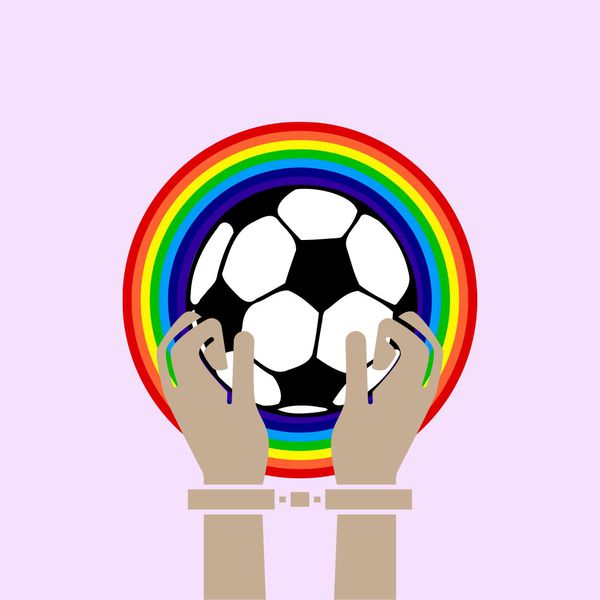Staff Editorial: Sports Washing and Hypocrisy in the 2022 World Cup

(Credit: Adeline Kovach)
February 2, 2023
The 2022 World Cup has been no stranger to controversy since the beginning. From unfair qualifying to the controversy surrounding the host, spectators have created their own penalties and disapprovals. While many people find unfairness in the qualifying games allowing some countries to progress and others to not, anger can only be so expressed as it is understood that it is the way of the game; teams win and teams lose. With or without their home country in the game, major sports fans are some of the most willing fans in the world. Whether it is to support their country in national pride or in their favorite sport, fans will travel wherever to watch their team on the front line. This year though fans have found themselves in a position of deciding between morals and an experience of a lifetime. The 2022 World Cup is being hosted in Qatar which has created a whirlwind of discussion. Qatar has been no stranger to social injustices surrounding women, labor, and LGBTQ rights. With hosting the World Cup soccer fans are accusing the country of “sports washing,” a term used for countries that attempt to tarnish bad reputations by hosting major sports events. With support from FIFA, the 2022 World Cup has been more controversial than a referee pulling out a red card.
Prior to the World Cup issues have surrounded the country of Qatar. Issues of women’s rights, LGBTQ rights, and slave labor have been no stranger to their people. In Qatar, women’s limitations stretch further than their rights. Examples of their limitations start from their birth as sons are prioritized in inheritance and authority in the family. From any age forward, women are able to get married with permission of a male guardian.
Women and children are able to be married off into a marriage with other wives, as polygamy is legal for men. If a woman chooses to practice sex or get pregnant outside of marriage, she can be punished by execution. Women in Qatar can choose to work, though her options are limited due to laws prohibiting women from some jobs due to their “dangerous,” or “difficult,” qualification. Within the jobs they are able to obtain danger is still a variable as there are no laws protecting discrimination and harassment towards women in the workforce. The woman of Qatar should not have to feel like the rest of the world does not hear or see their injustices. FIFIA allowing Qatar to host despite their treatment of women clearly shows FIFA’S priorities of money over morality.
While ownership and forced labor of an individual has been outlawed in most countries, legal loopholes have made their way in the workforce of Qatar. Migrant workers from India, Bangladesh, Nepal, the Philippines, and Kenya were taken by bus to their worksites to work in temperatures scorching up to 102*F. Death and injury found their way to these work sites without any compensation or investigation on the issues. Young seemingly healthy men were meeting their death when working on the stadiums for the soccer event. Reports of over thousands of men have died due to extreme labor within the past decade involving both stadium building and other industrial buildings within the country.
Despite their claims that their working conditions are up to an international standard their mortality count cannot lie for them. FIFA came to Qatar’s defense claiming building the stadiums created job opportunities and benefits for the country despite knowing the public information concerning the country. No one is protecting these workers through legal or social action. Labor work should be protected under global law as these jobs keep communities running and industrializing.
Fighting for love should not be an everyday battle for anyone. For LGBTQ members in Qatar a war on love has always been the reality. Any acts of romantic, sexual, or physical displays/connections between same sex couples in Qatar are highly illegal. Under the Penal Code, homosexual individuals can face a fine, jail time, or even possibility of the death penalty for expressing their own identity.
Within the world cup spectators and players have shown their disapproval against these laws with subtle acts of protests such as social media posts, pride shirts, or even people running onto the field. Josh Cavallo, an openly gay player for Australia’s national team, brought attention to the disclusion he felt after FIFA banned “one love armbands,” while playing in Qatar. FIFA banning pride apparel due to the location of the game, shines a destructive light on the international organization. While FIFA is not directly stating homophobic views, their ability to quickly side with Qatar against pride disappoints soccer fans all over the country.
Although FIFA does not have an obligation to their players and fans to state their support, they are aware of the diversity of people who watch soccer. FIFA is creating a lack of representation for impressionable young soccer fans who either are or support the LGBTQ+ community.
FIFA, a multi million dollar international organization, has ruined the World Cup games for soccer fans all over the world with the clear and present care for money and media over social injustices.





